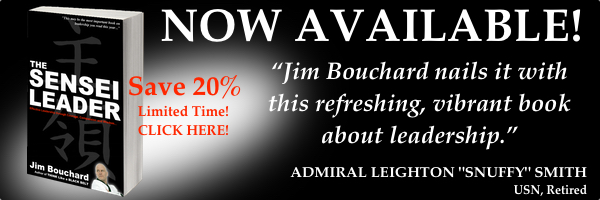 Part of the ongoing struggle to convince companies to invest in developing and preserving the character of their leaders is the difficulty in measuring ROI.
Part of the ongoing struggle to convince companies to invest in developing and preserving the character of their leaders is the difficulty in measuring ROI.
Thank you Fred Keil of KRW International for quantifying the value of good character in leadership. Thank you HBR for sharing his findings:
Character is a subjective trait that might seem to defy quantification. To measure it, KRW cofounder Fred Kiel and his colleagues began by sifting through the anthropologist Donald Brown’s classic inventory of about 500 behaviors and characteristics that are recognized and displayed in all human societies. Drawing on that list, they identified four moral principles—integrity, responsibility, forgiveness, and compassion—as universal. Then they sent anonymous surveys to employees at 84 U.S. companies and nonprofits, asking, among other things, how consistently their CEOs and management teams embodied the four principles.
Note the traits they identified as the most important:
- Integrity
- Responsibility
- Forgiveness
- Compassion
In THE SENSEI LEADER I organize them a little differently, but these characteristics are at the very core of what it takes to be a courageous and compassionate leader––and that makes you an effective leader.
I’ve been preaching the importance of these characteristics for some time now, and people are responding. It’s no accident that my message of character centered leadership resonates more with good organizations––organizations that already see the value in continual development of these core philosophical competencies.
I can’t fix rotten characters––neither can you.
I do, however, believe that most people can learn, assimilate, develop and expand these characteristics––but only if they’re willing.
If they’re not willing––they should be fired.
Again, the struggle I’ve always had is proving the tangible monetary value. I’m not a process guy. I’m not a numbers cruncher. My expertise is in helping people become better people.
So what, exactly, is that worth?
When it comes to leadership, Kiel demonstrates that it’s worth a lot!
The researchers found that CEOs whose employees gave them high marks for character had an average return on assets of 9.35% over a two-year period. That’s nearly five times as much as what those with low character ratings had; their ROA averaged only 1.93%.
The HBR article notes that Kiel and his team were not expecting those impressive results. I don’t think most people would have. It doesn’t surprise me at all.
We’ve known for some time what type of leader attracts and retains loyal and engaged followers. Loyal and engaged followers are the most productive employees and effective managers.
This does not happen by accident.
It starts with leadership by example. Then you’ve got to provide opportunities for your people to cultivate, practice and articulate these characteristics. This means training and continual perfection of best practices and techniques––in the mindset and character of your leaders.
I found this part of the article particularly telling:
Do leaders who need to work on their character know it? In most cases, no—they’re pretty deluded. When asked to rate themselves on the four moral principles, the self-focused CEOs gave themselves much higher marks than their employees did. (The CEOs who got high ratings from employees actually gave themselves slightly lower scores—a sign of their humility and further evidence of strong character.) Fortunately, Kiel points out, leaders can increase their self-awareness through objective feedback from the people they live and work with. But they have to be receptive to that feedback, and those with the biggest character deficiencies tend to be in denial.
Humility––authentic humility, that is, is a powerful indicator of character and one of the most important traits for an effective leader. In THE SENSEI LEADER I wrote:
Humility is a quiet expression of reserve. You might not know with certainty that you’re going to win the fight, but you damn sure know you deserve to be in the ring.
Tempered by humility, your confidence is independent of the desired or expected outcome.
Humility is the quality that keeps your mind and heart open to input from other people, even from the people who work for you.
This is just one example of how character translates to tangible value for your organization.
This is the type of confidence that makes a leader attractive—whether that leader is in a position of authority or command, or standing shoulder to shoulder with you in the trenches.
This is the type of confidence that will make you an effective person and an effective leader at any level, whether you want to work in command and control or on the front lines.
And as we’ve seen from Kiel’s research, that emphasis on character can translate into a 5 fold return.

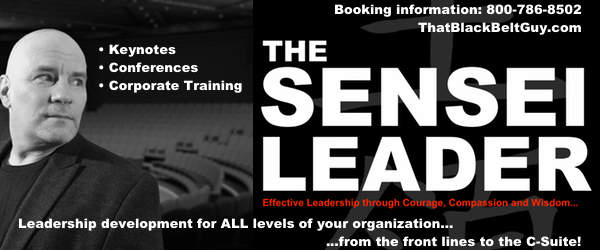
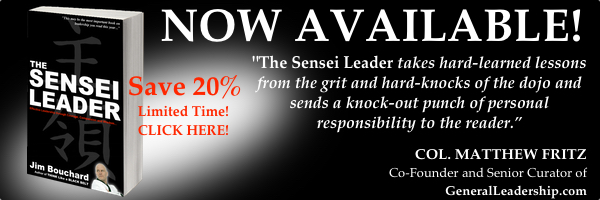


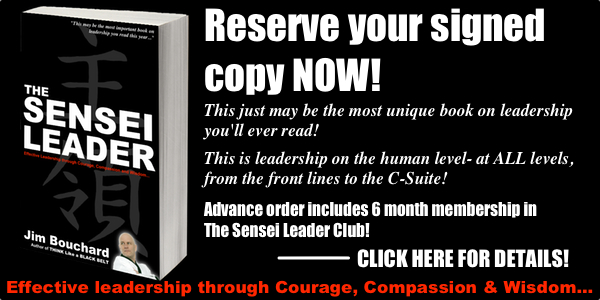






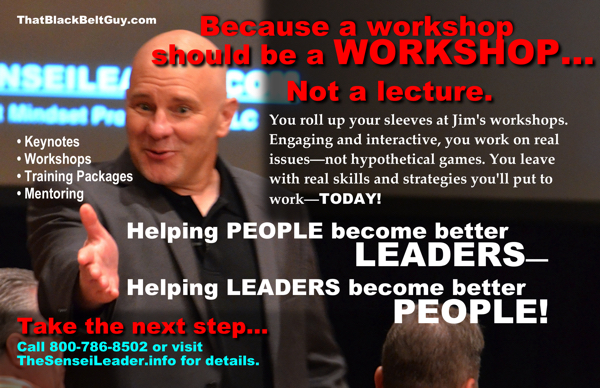

 I asked Jen where her Mom was right now. She told me her mother was waiting in the car- Jen was worried because it seemed like Mom couldn’t stay awake.
I asked Jen where her Mom was right now. She told me her mother was waiting in the car- Jen was worried because it seemed like Mom couldn’t stay awake.